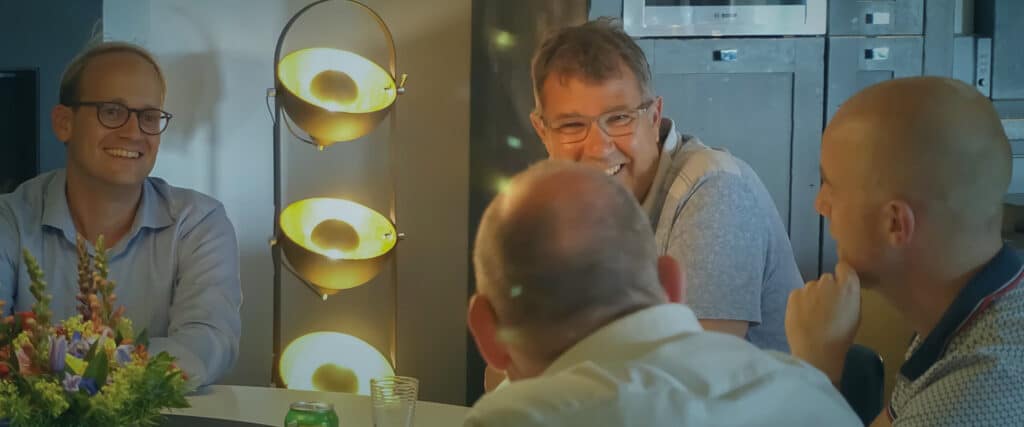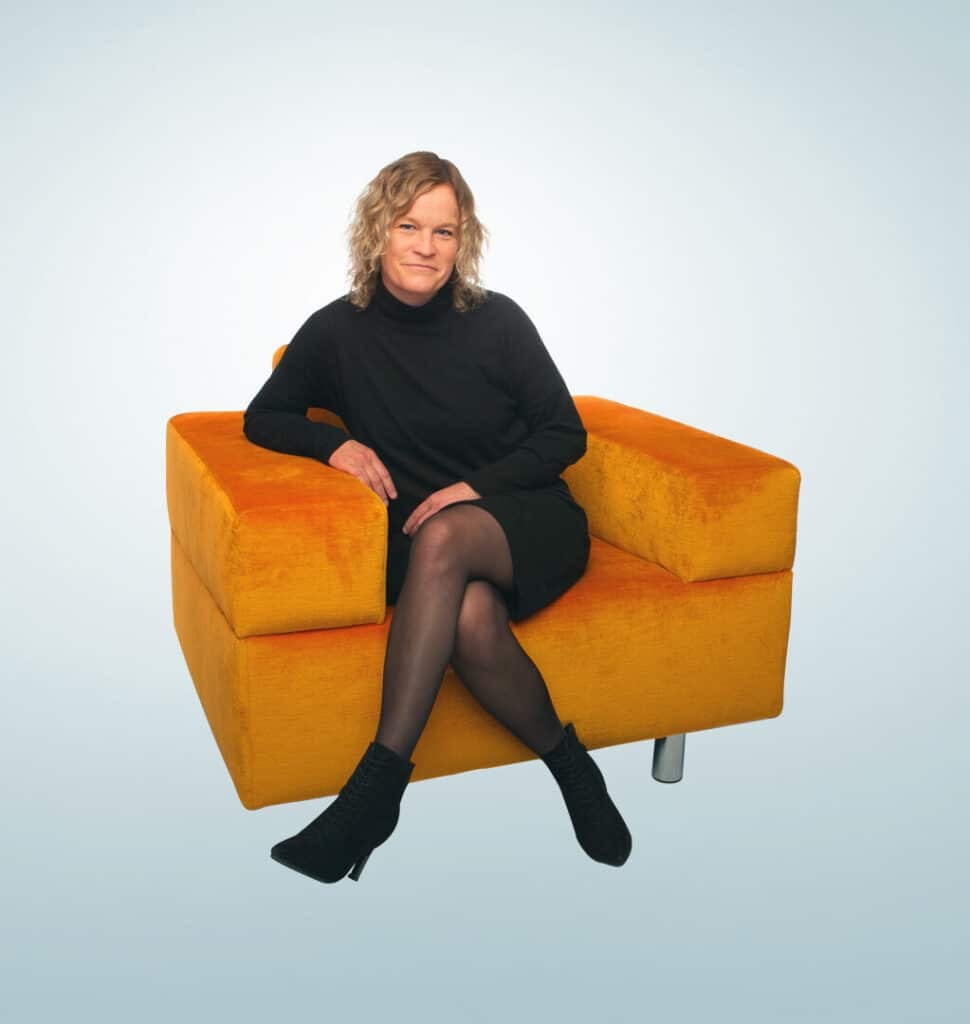On a beautiful summer day, I had an even better conversation with two members of the ITQ culture working group. A conversation about how they experience our culture, what our culture means to them. Curious? Enjoy reading interview below with Arjan Bodde & Frank Nijman.
Regards,
Ilona Dinkgreve
Arjan, who are you, can you tell us a little more about yourself?
Who am I? Those are always good questions. My name is Arjan Bodde and I’ve worked for ITQ about 16 years now. I think I was the fourth employee. I started out as a Unix Consultant. There were just a few of us, we started at the home office of Paul Geerlings, then moved to the Joop Geesinkweg in Amsterdam, followed by the office in Wijk aan Zee. I particularly like being with customers for a longer period. I like building a relationship with the customer and to deploy my knowledge and experience for a longer period of time.
And what about you Frank, who are you?
I started a little over 6 years ago. At my previous employer, we sold a product where the price was most important. Quality was inferior. This didn’t suit me, so I started looking around. Because I also maintained computers at this employer and liked doing so, the idea came to mind continuing this. After I shared my thoughts with my father-in-law, he ran into Francisco at a meeting and told him his son-in-law was a good IT-er. Despite the fact I had zero experience and had been a little oversold by my father-in-law, I was invited for an interview. Francisco and I immediately had a connection. At the end of our conversations Francisco said: ‘you are a smooth talker, why don’t you join our sales team?’ Well, that was exactly the thing I didn’t want to do anymore. But when Francisco told me that ITQ stood for quality, customization and always wanting the best for its client. That removed all downsides of sales for me and I was sold into the idea.
Arjan, how did you first get in contact with ITQ?
I was working at IlionX, we were mainly concerned with managed services, kind of detachment in Unix and Windows. I could no longer agree with the company policy, so I wrote an old-fashioned open job application letter. An extreme entertaining conversation with Francisco and Paul soon followed, somewhere in a restaurant along the A10. We shortly discussed technics, but soon we talked about me. Who was I, my wife, any children, hobbies and so on? All side cases, but I think it was the deciding factor. Already Paul and Francisco knew by fingerspitzengefühl who they were dealing with. After a conversation of two or three hours I went home, an employment contract in my pocket.
Frank, when you reflect on your 6 years at ITQ, what is engraved in your memory, what is something you will never forget?
I remember one time, due to circumstances I was the only sales at ITQ, which brought on quite some stress. I got help from all over, sometimes even without asking for it. Consultants worked overtime to help me out, even while it wasn’t their responsibility. What I like most is that we always fix everything together, we help each other out, no matter what title you have.
Arjan, do you recognize this?
Yes, I do recognize this, as of day one. It is a DNA thing, no matter how big or difficult the problem is, there’s always someone who can help, with whom you can talk about it. This can be customer- or personnel related. It gives this family feeling.
If I broaden the question. Arjan why is culture so important to you?
Culture is important to me, because it tells something about the person you are and the organization you are working for. I always compare it to a juice where you put in a number of ingredients, which make a nice tasty juice. Everybody puts in a flavour. I think it’s important, if I have a problem, I can call a colleague any time, night or day. The doors are always open. ITQ doesn’t impose a culture. It’s an organization where you actually feel a part of, where you can add to the culture. That is a very important factor to me.
Frank, let’s go back to the beginning of the culture project. You’ve been asked to describe the culture. We all had a good feeling about our culture, but you were asked specifically to work with this theme. Can you tell me how this worked out?
We all had a strong feeling what the ITQ culture is, but how can you make a feeling tangible? To make it concrete, we all soon came up with examples which reflect our culture. Thus, we came up with a couple of themes that gave our story some structure. We think we found a good balance between the buzz words and a substantial interpretation of our culture. Very simple actually, but it led to many evenings of discussion.
Arjan, when you look back on the past period, what are you most proud of, regarding what you achieved as the working group?
I am proud we delivered first inputs to the MT, in which we provided recommendations to secure our culture. The most fun thing we did was an interactive session at a vAfternoon, in which we held a live poll about the culture among the personnel. Lots of things we discussed at our sessions came back, which gave me a proud feeling.
Frank, is there something you think was great, something you’re proud of?
It is cool to see how the ITQ culture is within the people even if they are not aware of it. It makes you appreciate more how our culture is what it is. The process of the culture workgroup made the ITQ culture in the company even stronger than it already was.
Arjan, undoubtably there were difficult things in this period.
What I found most difficult, is not to try and convince others with your opinion, but to convince on content. You see, it is what you think how our culture works, or how it should work on others. I see things differently and sometimes wish things were different, but when you look at it on a wider group of people, you sometimes have to take a different approach. It has been a learning process for the cultural working group as well.
We are one, the heart of our organization: what does it mean to you? How does it reflect in real terms
Family sounds a bit cliché, but there really is a friendly bond between colleagues, in the working atmosphere you clearly notice we go for it together, we help each other to grow, we challenge each other. We are perfectionist people. We are not satisfied easily; we can always do better.
And if we continue to the theme Trust & Freedom, Frank?
This is very important to me personally. The foundation of ‘we are one’. What goes around, comes around. The blind faith that a colleague will not try to get better at the cost of you or a customer and that your colleague always speaks the truth. I feel that trust. Next to that, I love the freedom. Recently, I switched to another function. I don’t have any experience in this position. Still, ITQ says we will help you to do this. It’s your career, you decide. On the other hand, ITQ trusts I take my own development seriously.
And then on to Homebase. When you look back on your 16 years of ITQ Arjan, how would you describe the feeling of Homebase?
Personally, I don’t think of Homebase as a building with the characters ITQ on it. After all, we mostly work at the location of our client. I see Homebase as the company I work for, I don’t care where the office is situated. Being around other colleagues, makes us experience all cultural aspects. Like the vAfternoons, which we organize once a month, the Friday afternoon drinks, the annual barbecue and the ITQ weekend. The events we organize within ITQ tell us something about the DNA of ITQ. Everybody brings along a particular enthusiasm, which is very contagious.
ITQuality is also a theme. Frank, can you tell us some more about it?
That has to do with the fact that we are never satisfied with the quality we deliver. It is our biggest quality as a company, but also our internal pitfall: we sometimes take it to the extreme. We strive for the best solutions for our customer in the shortest period of time. You can also see quality in all events we organize, from the decoration to the food and drinks. It’s driven by passion. We strive to be the best in the market, and really go for quality.
Arjan, where do you find ITQuality in the drive of obtaining certificates?
It is a crucial part of our partnership with VMware and places us on the map. In our partnership with VMware it is important we meet requirements and to have accreditations. It is a recognition of our expertise. To keep developing, to keep on learning, wanting to be the best in what we do, is in our blood and expresses itself by obtaining accreditations and lots of certificates.
Now, the last theme: the ITQ-er. What is it, that makes an ITQ-er an ITQ-er?
Frank: All of my colleagues are a little weird in a good way, it’s like everyone has a twist which makes them good at what they do. The previous themes are connecting us, but every ITQ-er is a special person. We sometimes say our people are hand-picked, and that’s really what it feels like. Everybody is in a place where he or she can add the most value. We are a collection of specialists in an extreme niche, where we exceed together. All unique beings who are part of something cool. We are a bunch of passioned nerds and the best in our profession.
Arjan, last question: How can we keep the ITQ DNA alive, knowing the world around us is changing, and we ourselves too, of course?
I think within the cultural working group is a group of people who are very dedicated to ITQ and our culture. We are culture bearers. It’s about monitoring and guarding the foundation, we laid down together. I’m glad we captured our culture and we have some nice themes we can fall back on. We quickly can spot when decisions are made that influence our culture.
Frank, is there anything you would like to add?
I see it as marketing. If you stop doing it, it doesn’t mean you’ll be bankrupt the next day. That’s how I see it with maintaining culture as well. It is an organic process that we try to guide, in which we, the cultural working group, will test to see whether decisions, made by the company, fit our culture. We don’t take part in the decision making but do give advice and keep each other on edge. I do look at us as a bunch of culture boosters. It ensures that the culture evolves, but also is maintained.



